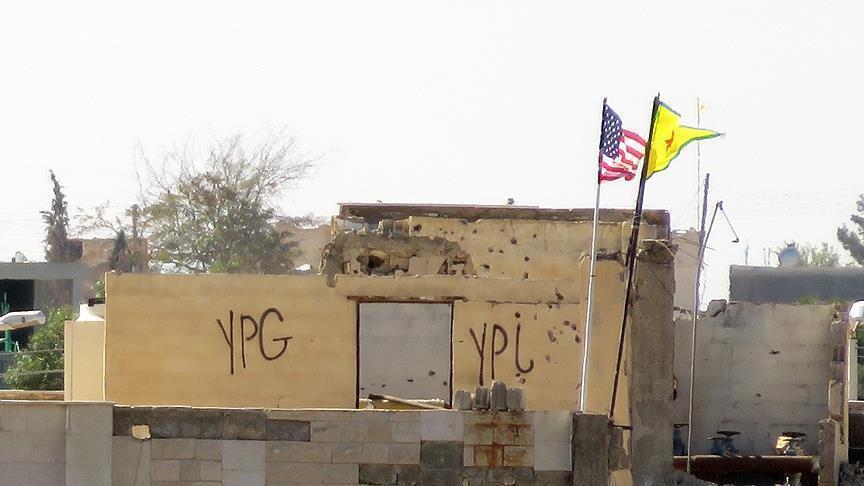ID :
461159
Mon, 09/11/2017 - 15:44
Auther :
Shortlink :
http://m.oananews.org//node/461159
The shortlink copeid
West ignores 'authoritarian nature' of PKK/PYD in Syria

LONDON
The West has ignored the authoritarian nature of the PKK/PYD, a London-based security analyst has said in search for an ally to fight Daesh in Syria.
A recent report has laid bare the ties between the PKK, which is listed as a terrorist organization in the EU and U.S. as well as Turkey, and the PKK/PYD in Syria.
Widely known as the YPG, the PKK/PYD is part of the same organization as the PKK, which has waged a campaign of terror against Turkey since 1984, resulting in tens of thousands of deaths.
However, the PKK/PYD has achieved widespread acceptance for its role in fighting Daesh in Syria.
“People wanted to be deceived -- and still do; people do not thank you for breaking an illusion and telling them they have been conned,” the report’s author Kyle Orton said.
His research -- The Forgotten Foreign Fighters: The PKK in Syria -- deals with the nature of the PKK, its hold over its Syrian surrogates as well as the potential security risks posed by Western citizens who have fought with the PKK/PYD and are now returning to Europe and the U.S.
The report for the Henry Jackson Society -- a U.K.-based think tank -- documents the PKK/PYD’s inner workings. These include summary executions, drug-running, human trafficking and a wide network of criminality across Europe used to fund the group’s activities.
It also highlights the oppression and violence meted out by these groups to Kurds in Syria who oppose them.
In an interview with Anadolu Agency, Orton said he “didn’t have any hesitation in writing about the PYD/YPG’s nature as a component of the PKK.
“The fact it was less known [in the West] that it should be was, if anything, further motivation to bring attention to it.”
Orton’s writing on the PKK’s “authoritarian” nature has attracted both support and criticism. The movement’s appeal to foreigners as a supposedly progressive force against Daesh has seen a number of Westerners travel to Syria to join its ranks.
‘Good guys’
He says a combination of adopting Daesh as a primary enemy and the PKK/PYD’s claims to represent a “universalist creed of democracy, secularism, women’s rights, and ecology, meant many Westerners felt an identification with the YPG”.
He added: “It didn’t matter that the reality was an organization that had never taken its eyes off Turkey nor turned away from its violently authoritarian past.
“Even the fact that the YPG’s statelet rests on collaboration with the [Bashar al-] Assad regime never got coverage.
“Too many people in the West wanted a ‘good guy’ in Syria, and the YPG offered itself for the role.”
He said the Western media had often uncritically reported PKK/PYD propaganda while the international anti-Daesh coalition’s adoption of the PKK/PYD as its ground partner against gave it an “extra dose of legitimacy”.
Orton said there had been “very little dissent” among the analyst community over his conclusions on the “authoritarian character [of the PKK/PYD] in the areas it controls and the security challenges posed by the YPG foreign fighters”.
“Naturally, the reaction from the YPG/PKK and its supporters has been fierce,” he added.
The report profiled 60 foreigners who joined the terrorist group from 12 countries and urged the U.K. government to distance itself from the PKK/PYD as it could potentially cause a crisis within Turkey -- a fellow NATO member.
It recommended the U.K. government “consider updating the Foreign Enlistment Act, to prevent Britons joining non-state actors engaged in conflict abroad”.
Those who returned from the PKK/PYD “should be screened to assess if they require any further state attention, either from the criminal justice system or social services,” the report said.
Britain’s government on Thursday told its citizens in Turkey, or those travelling there, that groups which may be legal in the U.K. were still outlawed by Ankara.
Foreign fighters
In a travel update issued by the Foreign Office, Britons were advised: “Some organizations in the region, though not proscribed in the U.K., such as YPG, Gulen/FETO, are illegal in Turkey.”
In July this year, former British soldier Joe Robinson, 24, who allegedly fought in Syria alongside the PKK/PYD in 2015, was arrested by armed police in western Turkey’s tourist hotspot of Didim.
Robinson had reportedly posted pictures on social media showing himself in combat gear and taking part in PKK/PYD operations. He remains in custody in Turkey and faces terrorism-related charges.
Other individuals who visited Syria and Iraq, or tried to join the conflict there, have also faced scrutiny back in the U.K.
Josh Walker, another British man who took part in PKK/PYD operations in Syria, was arrested under the Terrorism Act in December 2016 on his return to the U.K.
In 2015, teenager Silhan Ozcelik became the first British citizen to be convicted of trying to join the PKK and was jailed for 21 months.
Orton’s report advised the U.K. to add the YPG to a list of PKK operational pseudonyms.
“The PKK’s deceptive propaganda on the nature of its project in Syria and its ability to recruit through its media platforms -- whether traditional or social media -- should be counteracted,” the report advised the British government.
Orton added: “It is difficult to overstate how well the YPG/PKK messaging apparatus has worked during this war; it has targeted its audiences, especially in the West, flawlessly.
“The British government has been aware of the challenge of dealing with the YPG returnees for some time and is indeed wrestling with the extent to which terrorism laws apply.”
However, he argued that Western states should start proscribing groups like the PKK/PYD because of criminality in their jurisdictions rather than because of any solidarity with Turkey.
Calling for greater understanding of groups such as PKK/PYD, Orton said: “Far from battling terrorism, they’re in effect aiding one proscribed terrorist organization to overcome another.”





